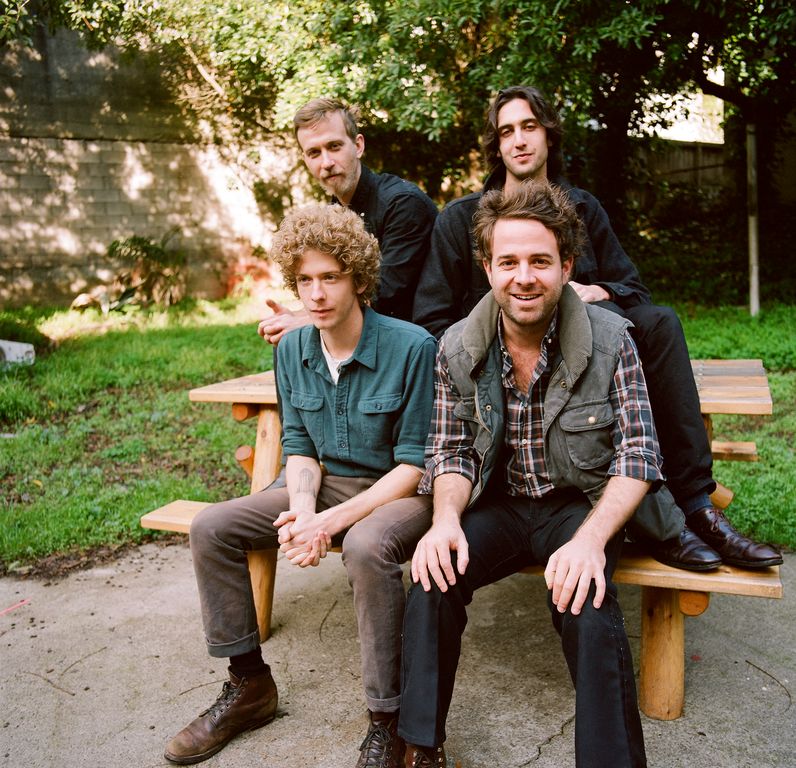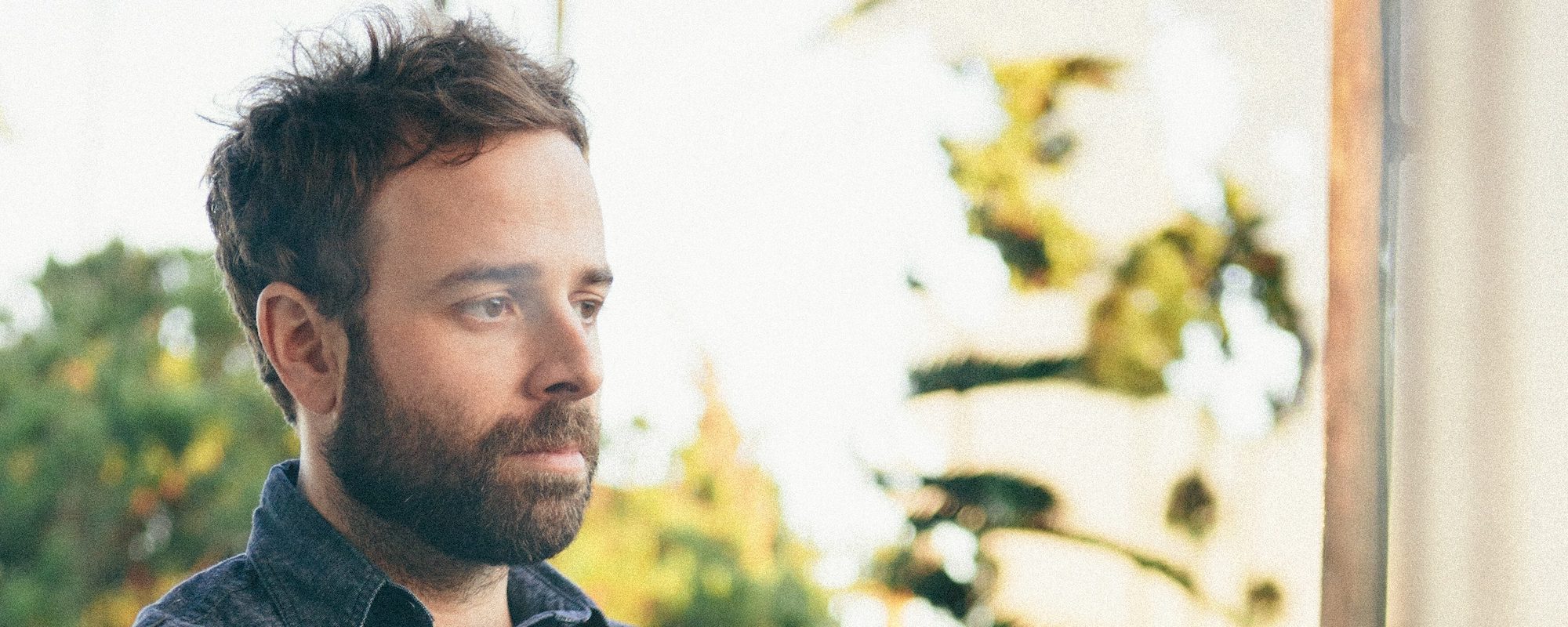Videos by American Songwriter
(Photos: Alissa Anderson)
This article appears in our March/April issue – subscribe here.
In the great myth of Dawes, Tay Strathairn, Wylie Gelber, Taylor Goldsmith and his younger brother Griffin were born in a golden hippie orb, high up in Laurel Canyon; the Goldsmith siblings harmonizing even whilst emerging from the womb, having already memorized the entire Crosby, Stills & Nash catalogue, hazed over in ‘70s Technicolor and smelling like patchouli. Except, like most rock and roll lore, this isn’t even remotely true. Marilyn Manson did not play Paul Pfeiffer in The Wonder Years, Paul is not dead and Ozzy Ozzborne did not eat live bats on stage, or at least intentionally. And Dawes is not a Laurel Canyon band.
Or, as Taylor says on a cool October Monday in Asheville, North Carolina over breakfast, “It borders on ridiculous. We have never lived there – I don’t think I’ve driven through, even, for years.” The band and I are gathered at a small, bustling restaurant called the Early Girl Eatery on a quaint, nearly Parisian-looking street in the mountain town, where the foursome have come to record their third record. This time of year, the leaves have all turned ludicrously gorgeous combinations of red, yellow and orange – “it’s the center of the universe here, when it comes to the season of Autumn,” is how Taylor puts it, wording things both directly and elegantly, as he is wont to do.
For whatever reason, Dawes has been associated with a certain kind of vintage sound since their inception in 2009, maybe due to their hometown (Los Angeles), musical abilities (warm solos, expert harmonies, narrative lyrics) and producer (Jonathan Wilson, who actually has lived in Laurel Canyon). It’s always been a confusing thing for the band, and you can tell it’s a touchy subject – bring up the word “vintage” and Taylor squirms a little, his features firming and ready to go on the defensive. But he has a right: listen to their first hit “When My Time Comes,” and you’ll hear a band bursting with youth and vitality, not dripping with sentimental, antiqued tones. They know people like to generalize, and they try not to take it personally – and it’s not like they designed their third album, Stories Don’t End, simply to set the record straight. Though they certainly wouldn’t mind if that was a happy side effect.
And sure, the boys probably didn’t intend to use nature’s most dramatic wave of the hand as a backdrop for some major shifts they’re making as a group – but then again, Dawes is never one to shy away from a metaphor. After recording their first two releases live-to-analog tape (North Hills and Nothing is Wrong) in Los Angeles with Wilson on former label ATO, they headed east, recruited a new production team (namely Jacquire King, who has worked with Kings of Leon and Tom Waits) and started up their own label, HUB Records (named after the 1930s Brooklyn “gang” of Wylie’s grandfather, Hard Up Bastards). But for the band, all of these changes aren’t really about creating something new. It’s about stripping away the dead weight of expectations and preconceptions. It’s about just being Dawes.
“We heard these stories about other artists, who, when they switch up the producer, it brings a really fresh take to things. No slight at all to the producer you worked with before, of course,” Taylor says, the band’s lead singer, guitarist and primary songwriter, always careful not to mince words. “We’re so proud of the two records we have made, but we don’t want someone to say ‘you’re the band that sounds like you’re from the ‘70s anymore. We live in 2013, and we aren’t trying to create a smokescreen of some life we don’t lead.”
Tay, long and lanky with his legs twisted beneath the farmhouse table and one shoulder propped against the wall, quickly leans in. At 32, he is the oldest of the four (everyone else is in their early to mid twenties), and he carries his maturity less in a fatherly way and more matter-of-fact. “Some producers have a real stamp,” he says. “But Jacquire caters to the process.”
“And he doesn’t have his own studio,” adds Griffin, drummer and the younger of the two Goldsmith brothers (there are actually five siblings in total), in a quiet near-mumble. His eyes are red, and he looks tired – unlike Tay, who is bubbling full of energy even though he’s been up since 6 a.m. It’s 10 a.m. now, and the band arrived perfectly on time to our breakfast – early by musician standards if you ask me – and all ordered the same dish with little tweaks: the Early Girl Benny, with ham for one, biscuit for the other, side of home fries for the next. Everyone wants hot sauce. They are from Los Angeles, after all.
Ah, Los Angeles. There’s something about that place that makes it difficult for its inhabitant bands to lose that “sunny California” moniker, particularly if they draw some influence from certain bygone eras where harmonies were favored over hard riffs. So it worked out well that King didn’t have a studio, which meant that the band could record wherever they like. And wherever they liked meant anywhere but their hometown.
“The biggest thing was simply getting out of L.A.,” Taylor says, picking at his breakfast. His attire is a similar version of his stage look: tucked-in blue and gray checked shirt, a cap that sits slightly back on his head and lets some hair peak out in front, slacks. “We have a lot of love for Los Angeles and a lot of pride. But we did think it could be good for us to be somewhere where we aren’t among our friends and fellow musicians, who are on some level effecting the recording experience.”
After ruling out Nashville, Asheville seemed like a nice, unobtrusive place to settle. They’ve been working, mostly, and doing little else, save for the occasional walk by the river or jaunt to a local restaurant – most recently to foodie haven The Admiral, of which Tay waxes poetic about the sweetbreads and steak tartare (he loves to cook when he’s back home in California). It’s easy to get the impression that this is a group who sees more sunrises by virtue of getting up early than by staying up late, greeting the orange sky with a glass of juice instead of whiskey.
“We try sometimes,” says Wylie, the band’s bassist, resident luthier and craftsman. He’s quiet but smiling – never really hitting on the more argumentative points of conversation, preferring to hang back and listen. Back in Venice, where he lives, he spends a good deal of his time in his home workshop, an impeccably organized space filled with more types of screwdrivers and wire cutters than I knew existed. He just finished building his first bass, which has a rustic raw-wood looking body and a little tag that reads “Gelber Co.” on the pickguard, which he’s since played on some of the band’s dates opening for Mumford & Sons. “At the end of the day were like, ‘we should go out tonight!’ And then we just end up staying home.”














Leave a Reply
Only members can comment. Become a member. Already a member? Log in.